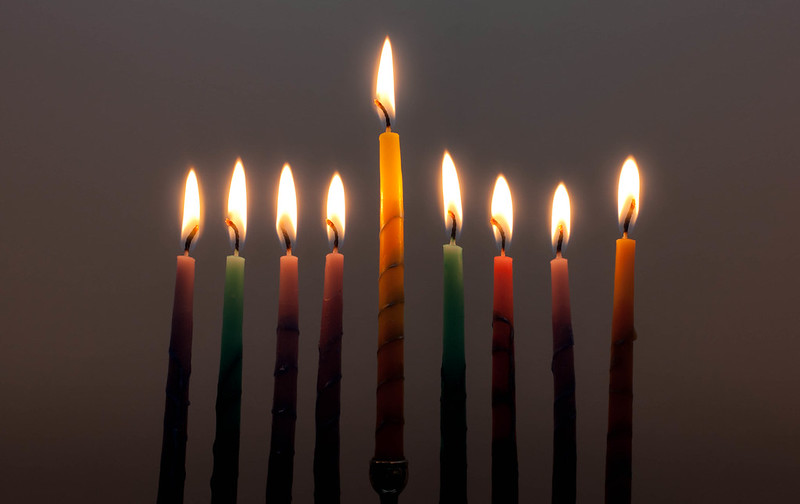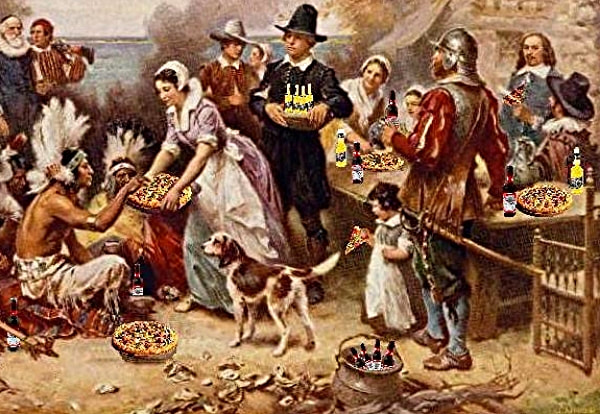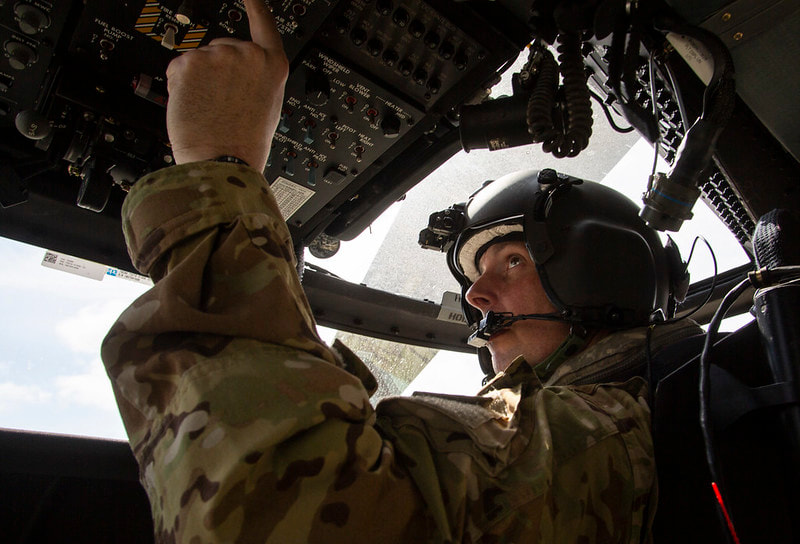|
The historical event called Chanukah or Festival of Dedication should speak to the Church in this season. The chaotic, volatile, and corrupt days we are living in are similar to those that the Jews were experiencing in 165 BC. When the Assyrian army invaded Jerusalem darkness began to overcome light. Jews were forbidden by the Assyrians from practicing their faith. Called "Hellenization," the invaders' goal was to absorb the Jews into the Greek culture. Some among the Jews were embracing the alternative lifestyles and living outside of Godly boundaries. This led to persecution of those Jews who were trying to live according to God's ways. Those who were faithful to God's laws were caught in a trap.
The final straw came when the priests were required to bow down to idols and the altar of the Temple was defiled as a pig was sacrificed on it. A priest named Mattathias and his son, Judah, were so distressed by this unconscionable act that they gathered a small army of men who engaged in guerilla warfare for three years. On Kislev 25 they were able to overtake the Assyrian army and reentered the defiled Temple. Chanukah commemorates the rededication of the Temple. After the Levite priests relit the lampstand (Menorah), they discovered that there was only enough oil to burn for one day. It took the priests eight days to make fresh oil, and miraculously, this is how long the lampstand burned. The Lord intervened to keep the lights burning. Hence, Chanukah is also called The Festival of Lights (Hag ha-urim). Symbolically, the Chanukah Menorah has eight candles with a ninth one in the center. Called the "Servant Candle" or "Shamash," its job is to light the other eight candles. The Shamash is the first candle to be lit during Chanukah and is then used each night to light the other eight candles. The prophet Isaiah foretold of a man of God who would come as a servant. "See, my servant will act wisely, He will be raised and lifted up and highly exalted. Just as there were many who were appalled at Him—His appearance was so disfigured beyond that of any human being and His form marred beyond human likeness—so He will sprinkle many nations, and kings will shut their mouths because of Him. For what they were not told, they will see, and what they have not heard, they will understand." (Isaiah 52:13-15) It is no accident that the middle candle is called "The Servant" and is used to light the others. Jesus, the Servant of God, is "the true light that gives light to everyone..." (John 1:9) He told a crowd of people, "I am the Light of the world. Whoever follows me will never walk in darkness, but will have the light of life." (John 8:12) The position of the Shamash on the Menorah is significant. Not only is it in the center, but it sits higher than all the other candles. The higher a light sits, the greater its impact. We see how Isaiah prophesied about the lifting up of the Servant. Jesus confirmed His position and His calling in John 12:32. 'And I, when I am lifted up from the earth, will draw all people to myself." In verse 36 Jesus gives this admonition to His followers: "Believe in the light while you have the light, so that you may become children of light." The candles of the Menorah were lit with anointing oil, a sign of separation and holiness. The name Jesus Christ is significant in both Hebrew and Greek. Messiah (Hebrew) and Christos (Greek) mean the Anointed One. Our Lord provides the oil of anointing and the light! He is the Shamash that ignites our flames and lights up our lives. Do you see the prophetic significance of the Menorah for the Church? The eight-day celebration of The Feast of Dedication should speak volumes to us. Let us remember the themes of Chanukah: Dedication, The Faithfulness of God, and The Victory of Light over Darkness. Let us also pray for our Jewish brothers and sisters who will light the first candle on their Menorahs tonight. May their eyes be opened to the truth that the Servant Candle is a representation of their Messiah who calls them to faith in Him. This year marks the 400th anniversary of the first Thanksgiving and a time to look back at God’s consistent faithfulness to America. Those who traveled across the Atlantic Ocean to begin a new nation were guided by the Lord to establish a place where He would be worshiped, and freedom of religion would be practiced. One of the meanings of the noun pilgrim is "a person who journeys to a sacred place for religious reasons." Our national holiday had its origins from the 1621 autumn feast held by the Pilgrims and the local Indians. The feast was meant to celebrate the harvest and the blessings of the past year. Included in the first Thanksgiving were 53 Pilgrims made up of four women, 14 young boys and girls, 13 infants and young children, and 22 men according to David Barton, the founder of Wall Builders. They joined 90 Indian warriors from the Wampanoag tribe. For three days they dined on game, vegetables, corn bread, and berries. In between eating, they engaged in competitions including running, wresting, and shooting. As students of the Bible, the Pilgrims sought to apply its principles. They spent time thanking God for delivering them from a land of persecution and bringing them to America where the native people taught them how to survive and prosper in their new land.
Looking back to the time when the Pilgrims were instituting a way of life in the "New World," we can see that their civil government started with the Mayflower Compact. Their belief in equality for everyone was demonstrated when all the passengers on the ship signed the Compact. Jon Hamill, a descendant of a Pilgrim and co-founder of Lamplighter Ministries, described the atmosphere when the original signers of the Compact gathered together: "The move of the Holy Spirit was with them. In fact, when they wrote the Mayflower Compact...they said, 'In the presence of God, and one another.' They honored the presence of God, knowing that God had sent them apostolically across the waters to found a nation in freedom, to found a nation in covenant with Christ." There is no doubt that a Christian heritage formed the basis for our country. As America prospered, those from other nations began to take note of her successes. Dr. Ben Carson, in his book, America the Beautiful, shares that in 1831 a Frenchman named Alexis de Tocqueville came to decipher the secrets of America's success. He wrote, "I sought for the key to the greatness and genius of America in her harbors...in her fertile fields and boundless forests, in her rich mines and vast world commerce, in her public school system and institutions of learning. I sought for it in her democratic Congress and her matchless Constitution. Not until I went into the churches of America and heard her pulpits flame with righteousness did I understand the secret of her genius and power. America is great because America is good, and if American ever ceases to be good, America will cease to be great." Alexis also wrote, "The religious aspect of the country was the first thing that struck my attention...In France I had almost always seen the spirit of religion and the spirit of freedom marching in opposite directions. But in America I found they were intimately united and that they reign in common over the same country." I think we can see evidence that 400 years after the first Thanksgiving and the enactment of the Mayflower Compact, our foundations are under attack. Religion and freedom are marching in opposite directions. The model for the laws incorporated into our Bill of Rights and the basis for all education—the Bible—has been cast aside. We must ask ourselves why many of today's pulpits are not flaming with righteousness and the goodness of America is compromised. The foundations of America must be rebuilt! It is time for us to embrace the legacy that the Pilgrims left for us. This Thanksgiving we should be on our knees in repentance for our cavalier attitude toward God and His Word. It is time for us to shore up our foundations with prayer and declarations from the Bible. Jesus told His disciples, "Men always ought to pray and not lose heart." (Luke 18:1 - NKJ) We must thank God for our Christian heritage and be faithful in our prayers for our nation and the church. From the time he was a young man, John Wright Follette's life was dedicated to the Lord. He was an obedient servant of Jesus who used his talents and abilities (singer, musician, teacher, preacher, artist, and poet) to bless many. Broken Bread is a book that records his messages centered on the Lord Jesus where he shares revelation on the meaning of God's Word. One of the chapters titled, "What do you do with your second choice?" grabbed my attention. Follette writes, "Nearly everyone has had to take a second or third choice as far as life's course was concerned. They have had to take the fragments and pieces of their first choice in life, which has been shattered, mend them together and make a success." The concept presented by Follette is that if we allow the Lord to break our self-will, the broken pieces can be used to create something beautiful that serves Jesus and draws us closer to Him.
How many of us can relate to Follette's supposition on the course of our lives? To confirm it, he tells the story of the famous artist, Whistler. Whistler's first choice was to be a soldier, but his studies at West Point were shut down when he flunked chemistry. He moved on to his second choice, engineering, and failed to make the grade for this career. Finally, he pieced his hopes together and started painting. The rest is history. He was meant for his third choice. The apostle Paul had an experience with God where he was shifted from his first choice to another. Seeing the darkness in the town called Bithynia, Paul was convinced that he should preach there. However, this is what Acts 16:7 records: "They tried to enter Bithynia, but the Spirit of Jesus would not allow them to." Follette explains that Paul was "checked abruptly by God. He thinks he has to go to a certain end of the earth, but the Lord says, 'I want you at another end.'" "Paul's first choice is ruined, His ambition, though godly and spiritual, is thwarted." Paul went down to the seaport of Troas where he waited. Here God revealed his plans for him through a vision where a man was begging Paul to "Come over to Macedonia and help us." (Acts 16:9) God's plan was to change the entire direction of Christian missions and move it from the East to the West. Follette asks some questions that would be good for us to ponder: "Can you take a second or a third choice and make it an opportunity in your life? Is your touch with God and the power of the Holy Spirit in your life strong enough to take that broken first choice and out of it make a splendid chance where God can come in and be glorified afresh?" Paul was not discouraged by the abrupt change of plans because he was dedicated to the will of God in his life. The life of Jesus demonstrates the same sequence of events. Follette says, "His first great desire was a ministry among His own people...But 'His own received Him not.' He wanted Israel, but that Bithynia never opened to Him. He found Calvary instead—His Troas. What did He do? He made Calvary, made Troas, to become the doorway to Macedonia and to all the ends of the earth." If we are willing to collect the broken pieces of our first choice, with God's direction, we can use them to make something divine. It seems that brokenness is part of God's process for transformation. Remember the lad who brought his lunch (five loaves and two fish) to a gathering with Jesus. He had to give up all he had to see how Jesus would use the broken pieces of his lunch to feed 5,000. Missionary to Peru, Ruth Stull, says, "If my life is broken when given to Jesus, it is because pieces feed a multitude, while a loaf will satisfy only a little lad." I am reminded of a Japanese art form called Kintsugi. The process includes collecting the broken pieces of pottery and reconstructing them so that they turn into something beautiful. The mending is done by cementing the pieces of the pot together with visible gold seams. This art form is built on the idea that in embracing flaws and imperfections, one can create an even stronger, more magnificent piece of art. Brokenness is part of our lives. However, as we submit the broken parts to Jesus, He will make us better and draw us closer to Himself. 1 Peter 5:10 says it well: "And then, after your brief suffering, the God of all loving grace, who has called you to share in His eternal glory in Christ, will personally and beautifully restore you and make you stronger than ever. Yes, He will set you firmly in place and build you up." (TPT) We must ask ourselves a question: Are we willing to sacrifice our first choices so that God can use the broken pieces of our will and transform us into a vessel of beauty fit for the Master's use? Follette's chapter on second choices concludes this way: "Out of the broken fragments of my first choice I shall mend together a most glorious opportunity in which God may rest and delight Himself." Jesus had much to teach His disciples before He left the earth. Knowing the frailty of humankind, He promised that Father God would send the Holy Spirit to remind them of everything He said. He also promised to leave them peace: "Peace I leave with you; my peace I give you. I do not give to you as the world gives. Do not let your hearts be troubled and do not be afraid." (John 14:27) When Holy Spirit came at Pentecost, the disciples were launched into a new level of faith and trust in the Lord. Holy Spirit is still with us to guide and empower us. It is important for us to remember this, especially this month, the ninth on the Hebrew calendar. Called Kislev, the name of the month is derived from the Hebrew word for security and trust. While the eighth month was the month of the flood, this month is the one of the rainbow when God made a covenant with Noah and his family. That covenant is an everlasting one, meant for us today. For Noah and his family, the ark was a place of peace and rest during the storm. Jesus is now our ark during the storm, our abiding place of peace.
I love the stories in the Bible of those who were able to overcome overwhelming obstacles and win unwinnable battles through trusting in the Lord. One of my favorite accounts is of Gideon against the Midianites who invaded Israel like a swarm of locusts. When all of Israel cried out to the Lord, He selected an unlikely person to crush the Midianites. After questioning the angel of God to see if he was for real, "Gideon built an altar to the Lord and called it The Lord is Peace." (Judges 6:24) An army from four of the tribes of Israel joined Gideon to fight the enemy in the Valley of Jezreel. Wanting the Israelites to know that they had no part in the victory God was about to give them, He reduced the size of the army from 32,000 to 300 soldiers. The opposing army was so huge that it is reported in Judges 7:12 that "their camels could no more be counted than the sand on the seashore." But here is what it says in Psalm 60:12 and Psalm 108:13, "With God we will gain the victory, and He will trample down our enemies." As the Israelites blew their trumpets, broke their jars with torches inside, and gave a shout, the Midianites fled and turned on one another with their swords. What an unlikely victory! Do you ever wonder if these types of miracles still happen? I can tell you most assuredly that they do! God is fighting for His people so that we can have peace in the battle. On October 28, Vision for Israel posted an uplifting reflection from an Israeli pilot who participated in the 1973 Yom Kippur war. War erupted on this most sacred day on the Hebrew calendar. Both the northern and southern borders were attacked on October 6, 1973, by Syria and Egypt. Since the attack took place on Yom Kippur, most of the Israeli soldiers were at home with their families. Here is the testimony of the Israeli pilot who flew over the Sinai: "I saw from the cockpit the incomparable balance of power, hundreds of enemy army tanks, and thousands of Egyptian solders approaching and fighting. On the Israeli side, there were very few military forces to provide protection for the borders. From above it seemed shocking! It could end in a Holocaust and the destruction of an entire state, the State of Israel. I did not believe what I saw...But suddenly I see an amazing spectacle! Masses of Egyptian soldiers returning towards Egypt, tanks retreating. Some of the enemy fighters raised a white flag and surrendered, and I do not understand what was happening. I'm stunned and ask myself, what's going on down there?" The Israeli pilot heard the story from the Egyptian side: "As the Egyptians advanced toward Israel, they suddenly saw masses of Israeli soldiers. They were sure they were falling into a trap from which they wouldn't come out alive...Out of fear and anxiety they decided to surrender. I knew that there is a God in heaven, that He guards us with all His angels. Thanks to His defense and intervention we were able to win the difficult and bloody war." The formerly unbelieving pilot who gave this testimony became an observant and God-fearing Believer after the miracle he saw that day. For those of us who are facing a serious conflict, be assured that the same God who delivered Israel in 1973 will also deliver us. Let this be an encouragement for us to have increasing levels of peace and trust in the Lord amid our circumstances, especially during this month of Kislev. |
Joan E. MathiasCategories
All
Archives
July 2024
|




 RSS Feed
RSS Feed